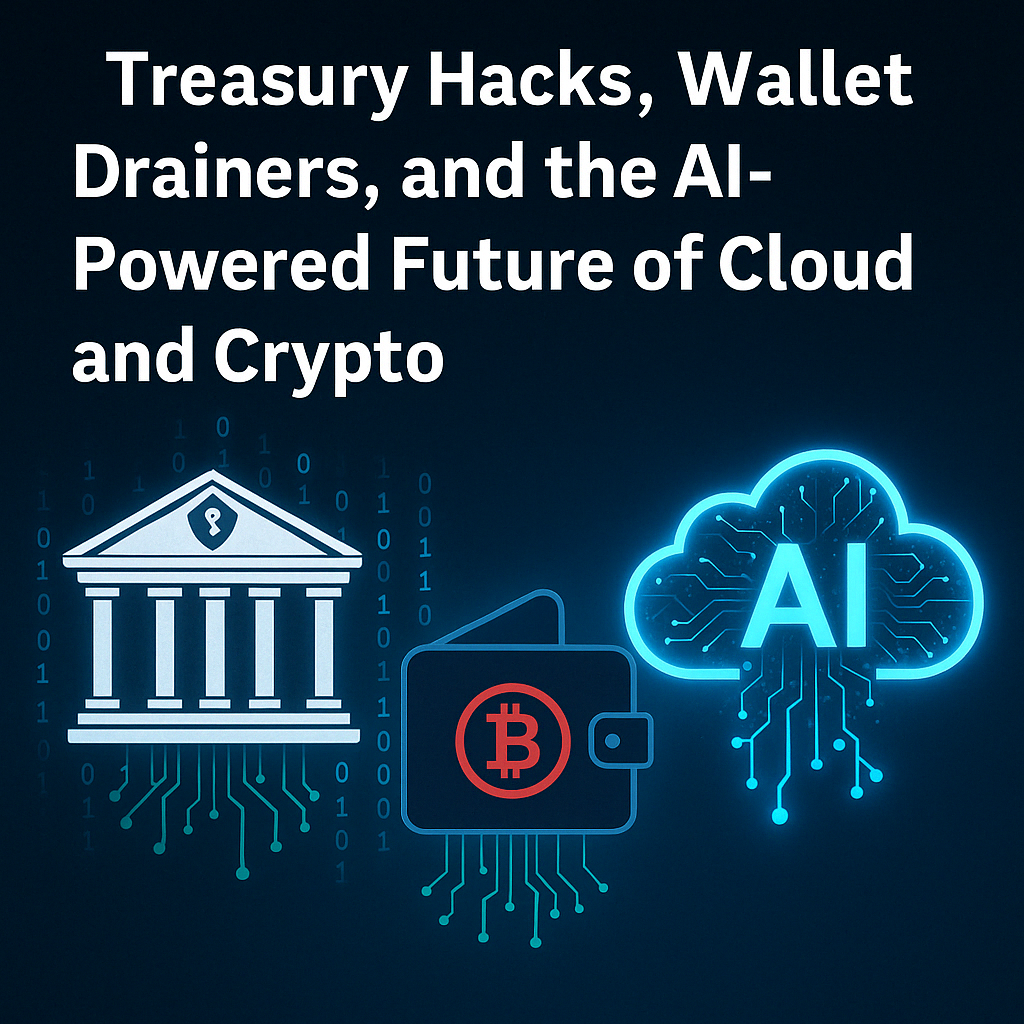In Episode Three of Fringe Lines, Quinn Devery and William “Doom” dive into the latest headlines in cybersecurity, crypto, and cloud computing. From state-sponsored hacks and crypto wallet drainers to generative AI tools and NVIDIA’s on-prem AI hardware, the episode is packed with insights on how technology, trust, and infrastructure are evolving.
🔐 Cybersecurity Headlines and National Threats
1. U.S. Treasury Hack
- What happened: Chinese state-sponsored hackers exploited a vulnerability in BeyondTrust remote support software.
- Impact: They accessed employee workstations and stole unclassified documents, making it one of the most serious cyber intrusions on a U.S. government entity in recent years.
- Key takeaway: The incident underscores how sensitive infrastructure remains vulnerable—even when using “secure” tools. Awareness and resilience are becoming civic responsibilities.
2. Chrome Extension Supply Chain Attack
- Scope: At least 35 Chrome extensions were compromised, affecting over 2.5 million users.
- Goal: Attackers targeted developer credentials to push malicious code updates, hijacking trusted software.
- Insight: It highlights the risk of supply chain infiltration, where even secure users fall victim through trusted, compromised sources.
3. $494M in Crypto Wallets Drained in 2024
- Vector: Wallet drainer malware compromised over 332,000 addresses.
- Dume’s insight: Most attacks likely involved users storing their seed phrases or private keys in unsafe places like cloud storage or password managers. Rule #1 in crypto? Not your keys, not your crypto.
💰 Crypto Markets and Wallet Security
Hot vs. Cold Wallets
- Hot wallets like MetaMask are convenient but prone to phishing/malware attacks.
- Cold wallets (like Ledger) are hardware devices where crypto is stored offline.
- Pro Tip from Dume: Print your seed phrase and store it securely—never online.
Bitcoin Tops $100K
- Milestone: Bitcoin saw record inflows, including $908M into Bitcoin ETFs in a single day.
- Market sentiment: Despite concerns about USD devaluation, demand for Bitcoin is growing.
🪙 Stablecoins Explained
What are Stablecoins?
- USDC and USDT are pegged 1:1 to the U.S. dollar.
- Purpose: Provide a stable digital currency for transactions and reduce forex friction globally.
- Emerging Regulation: The Payment Stablecoin Act may introduce a regulatory framework that legitimizes these digital dollars in the U.S. economy.
Why It Matters:
- Businesses may adopt stablecoins for cross-border payments.
- Governments may favor stablecoins over Bitcoin to reinforce the U.S. dollar as the global reserve currency.
☁️ Cloud + AI = The Next Frontier
Google’s Gemini + Deep Research Tool
- What it does: Lets users define a research hypothesis and then uses AI agents to gather, cite, and synthesize content.
- Quinn’s test: A request to map cybersecurity markets returned a full report in minutes, with sources and thoughtful recommendations.
- Gamechanger: A preview of how black-box agentic AI workflows could revolutionize business tasks.
NVIDIA’s Grace Blackwell AI Desktop
- What’s new: A local compute platform with no cloud access required.
- Dume’s reaction: Possibly the Alexa of AI—maybe not needed today, but could become ubiquitous.
- Quinn’s take: This move reinforces NVIDIA’s platform dominance—but raises questions about real-world ROI for ultra-high-power local AI.
🎯 Key Takeaways from Episode Three
| Topic | Insight |
|---|---|
| Treasury hack | Even “secure” systems can be breached—resilience is everyone’s job. |
| Wallet hygiene | If your crypto keys are online, you’re doing it wrong. |
| Stablecoins vs. Bitcoin | USDC/USDT offer global payment benefits with lower volatility. |
| AI tools in cloud | Agent-based tools like Deep Research are already transforming workflows. |
| NVIDIA Grace Blackwell | Local AI compute could shift edge use cases—if adoption follows. |
🔮 Looking Ahead
The podcast wraps with two future-focused themes:
- Cloud coverage is coming. Expect more on generative AI tools, model hosting, and the evolution of on-prem vs. cloud intelligence.
- Decentralized trust and AI need each other. As AI-generated content grows, blockchain could become a foundation for verifying authenticity and origin.
Listen to Fringe Lines
If you liked this episode, hit follow, leave a review, or comment with topics you want covered. Expect deep dives into the future of cloud, crypto, cybersecurity—and everything in between.
See you next week on Fringe Lines.


Leave a Reply